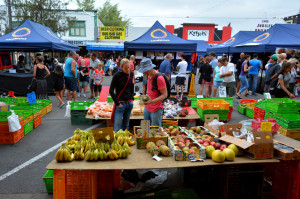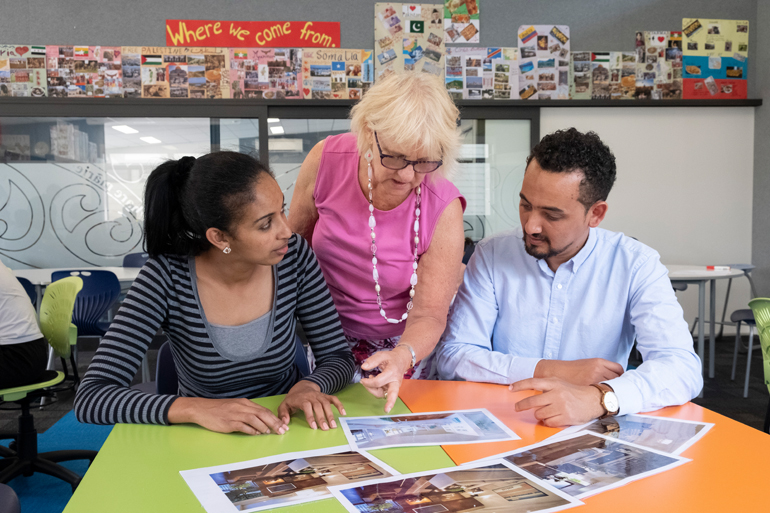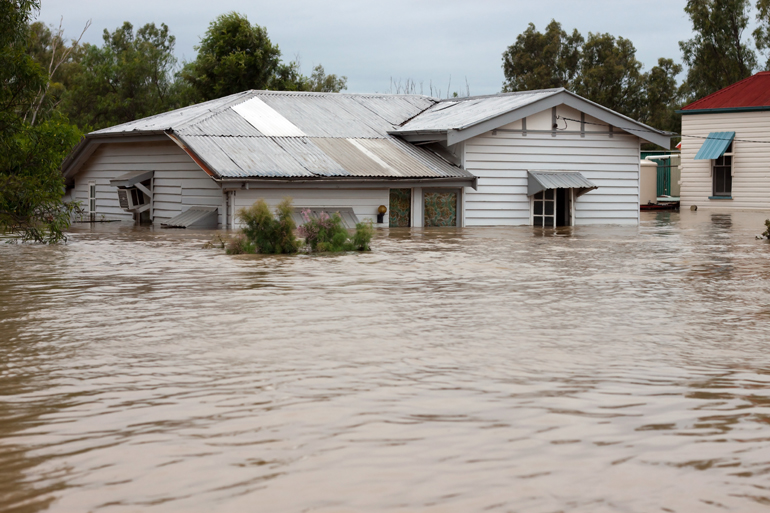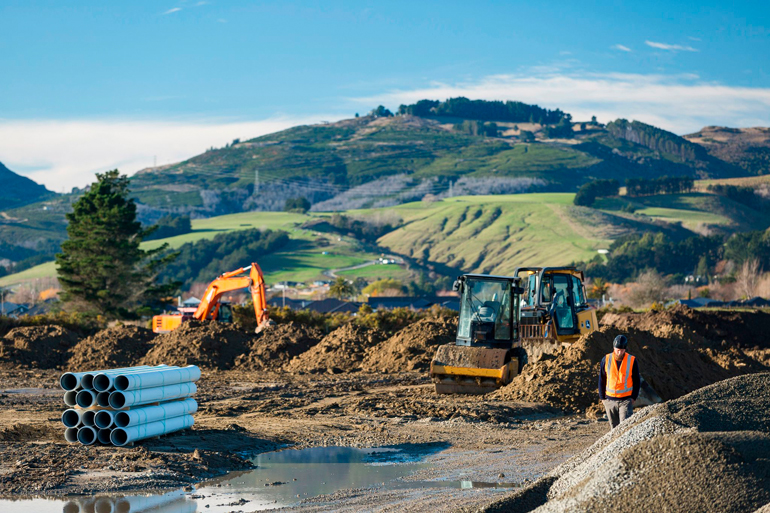Te arotake i te tau nei | Our year in review
This report outlines significant activities and achievements across 2022/23. It reflects the efforts of our many kaimahi/employees, who are proud of the services and results they deliver for the people of Aotearoa New Zealand.
On this page
The 2022/23 year was a big year for Aotearoa New Zealand and MBIE. We began the year by looking beyond the impact of the COVID-19 pandemic and focusing on strengthening the economy and reconnecting to the world. Then, in early 2023, we and many other government agencies swung into action in response to the disastrous flooding and cyclone that affected so many people and businesses in the upper North Island.
These events highlight the way in which MBIE continues to deliver core services and systems that underpin the country’s economic performance and wellbeing. This is especially so as we seek to grow opportunities (puāwai), act as a guardian and protect (kaihāpai) and innovate and navigate towards a better future (auaha). This also demonstrates how MBIE can shift its resources and energy quickly to the issues and places where help is most needed.
What we achieved: highlights in 2022/23
Puāwai: To grow opportunities, we:
-
Managed over 2,700 regional investment projects valued at more than $4 billion.
-
Supported the preparation and hosting of major events, like the FIFA Women’s World Cup Australia & New Zealand 2023.
-
Registered 35,700+ New Zealand Business Numbers (NZBN), 2,600+ identifying as Māori businesses.
-
Distributed $65 million in grants to help businesses clean up and get resestablished following Cyclone Gabrielle.
-
Revamped our immigration settings to reconnect internationally, address skill shortages and speed up economic development.
-
Completed the Marae Renovation Programme and supported the restoration and refurbishment of 349 Marae.
Kaihāpai: To be a guardian and to protect, we:
-
Delivered over 15,000 interventions through MBIE’s Employment Dispute Resolution Services.
-
Published 97 voluntary consumer product recalls and identified 13 high-risk consumer products.
-
Processed 178,000+ bond lodgements through Tenancy Services, totalling over $334 million.
-
Supported the passing of the Worker Protection (Migrant and Other Employees) Bill.
-
Updated National Seismic Hazard Model (NSHM) which helps manage risks to safety, security and the economy from seismic events.
-
Received 7,700+ reports of cyber incidents.
Auaha: To innovate and navigate, we:
-
Delivered the 400th mobile tower as part of the rollout of 5G services.
-
Launched the Aotearoa New Zealand Aerospace strategy.
-
Supported the development of industry transformation plans to innovate and support communities.
-
Provided nearly 81,000 rural homes and businesses with improved broadband through the Rural Broadband Initiative.
-
Approved 71 projects and allocated over $236.5 million allocated through the Endeavour Fund, Aotearoa New Zealand's largest contestable research fund.
-
Made $1.7 million available to encourage New Zealanders to live sustainably through the Support for Energy Education in Communities Programme.
Puāwai, growing opportunities
 MBIE’s work supports people, sectors and regions to be prosperous and adaptable, and to continue to grow and thrive. We want to make it easy to develop businesses and to support economic development that builds resilience, generates jobs and empowers communities.
MBIE’s work supports people, sectors and regions to be prosperous and adaptable, and to continue to grow and thrive. We want to make it easy to develop businesses and to support economic development that builds resilience, generates jobs and empowers communities.
This year, MBIE has focused on reconnecting Aotearoa New Zealand to the world and on initiatives to support a thriving economy. This included a strong focus on immigration, projects to drive economic development and increase community well-being.
Reconnecting Aotearoa New Zealand and re-balancing the immigration system
At the end of July 2022, the borders fully reopened. Revamped immigration settings have been a major focus of efforts to reconnect internationally, address the immediate skill shortages and speed up economic recovery from the COVID-19 pandemic. Settings have included:
- An employer led process to access migrant workers where genuine skills or labour shortages exist.
- A one-off residence pathway targeted at people already working here in non-seasonal roles.
- A new streamlined process to achieve residency for globally hard-to-fill roles, including in the health sector.
- Increases to seasonal worker numbers.
- Encouraging the return of working holiday makers.
These changes are helping to retain and attract significant talent and skills that are important now and for future wellbeing. For more information, visit:
Growing regions and communities
Helping regions to grow and improving the wellbeing of New Zealanders living in communities across the country, is a core part of what we do.
Investing in our regions
We deliver government funding to nurture each region’s economy so it can grow and develop, and reach its full potential. As at the end of June, MBIE’s regional investment arm, Kānoa – Regional Economic Development and Investment Unit (Kānoa), managed 7 funds and over 2,700 projects for a combined total of over $4.38 billion.
The sectors supported through these investments span, among others, advanced manufacturing, aquaculture, energy, construction, film, information communication technology (ICT), infrastructure, tourism and training. Flexibility across our investments and an on-the-ground presence means we are able to respond to regionally specific needs and context.
Māori economic development and communities
MBIE has a significant focus on Māori economic development and engagement with communities. The Māori economy has seen substantial growth over the past decade. Māori businesses often draw on inter-generational knowledge, such as sustainable resource management, and embed a focus on to strengthen and build resilience in the economy.
MBIE aims to ensure collaborative strategies are in place. An important focus was the refresh of He Kai Kei Aku Ringa, the Māori economic development strategy.
The whakatauki “he kai kei aku ringa” literally means “food by my own hands”. Under the refresh, the scope has been broadened to include the environment, prosperity and wellbeing. He Ara Waiora provides a tikanga based wellbeing framework for 5 new objectives in the strategy, in particular, Te Taiao (the natural world) and Te Ira Tangata (the human domain).
Under this framework, the objectives for He Kai Kei Aku Ringa address climate change mitigation and adaptation, identity in the economy, prosperity, self-determination, and building foundations for the future.
He Kai Kei Aku Ringa will be delivered through an action plan that draws together new and emerging projects from across government agencies, with the Māori Economic Development Advisory Board continuing to act as kaitiaki.
This year, we also completed the Marae Renovation Programme. In partnership with Te Puni Kōkiri, we supported the restoration and refurbishment of 349 marae across the motu. Around 2,400 employment opportunities (non-permanent jobs) were created. Of these workers, over 900 were Māori and over 200 were not in employment, education or training (NEET). Marae have an important role in Māori communities and are increasingly becoming involved in community responses to natural disasters.

Supporting business
In recognising the critical importance of ongoing commercial activity to the country’s national wellbeing, MBIE has advanced efforts to make sure businesses have access to tools and support, especially as they navigate challenging times and shifting practices.
Information and tools
In the past year, we have continued to improve our small business content, tools and resources, including areas such as mental health and wellbeing, climate action and exporting.
For example, the business.govt website now includes 45 interactive tools, 47 visual guides and templates as well as several other resources for firms, from setting up a business to developing important documents, to advice on what to do in the event of a computer hack. One of the more popular tools is the Employment Agreement Builder, which creates contracts tailored to businesses and the people they employ.
In early 2023, we provided resources and information to the Government’s Flood and Cyclone Support initiatives for New Zealand businesses.
Business payment practices
MBIE works to enhance the environment in which businesses operate, such as improving access to information they need to make important decisions. The Business Payment Practices Act 2023 introduces measures that require large firms to publish information about how fast they pay their suppliers. This will help small businesses choose who to do business with and encourage larger firms to improve their payment practices to manage any reputational risk. Small businesses account for more than 97% of all businesses in Aotearoa New Zealand. Poor payment practices can have flow-on effects for the wider economy, particularly in times of economic uncertainty.

Kaihāpai, acting as a guardian and protecting
 Much of what we do every day is about protecting the people and environment of Aotearoa New Zealand. From significant policy changes to updating regulation work, to enabling those seeking refuge to enter Aotearoa New Zealand, the work we do is about making sure New Zealanders feel safe.
Much of what we do every day is about protecting the people and environment of Aotearoa New Zealand. From significant policy changes to updating regulation work, to enabling those seeking refuge to enter Aotearoa New Zealand, the work we do is about making sure New Zealanders feel safe.
Fair and safe systems
Making sure we have fair and safe systems is critical to the country’s economic and people’s personal wellbeing. This year, we supported the passing of significant legislation and focused on enhancing our stewardship role across a range of Aotearoa New Zealand’s regulatory systems.
Accident compensation maternal birth injuries
On 30 September 2022, the Accident Compensation (Maternal Birth Injury and Other Matters) Amendment Act came into force. The Act improves gender balance, fairness and equity in the Accident Compensation Scheme.
The amendments ensure coverage from injuries that result from the birthing process, from onset of labour through to the pēpi/baby being delivered. Extending cover for these injuries means birthing parents can access existing support and treatment available through the scheme, including support for mental injuries caused by maternal birth injuries. This is the first expansion to Accident Compensation Corporation (ACC) cover in over a decade, in a highly technical subject area, involving working closely with clinical, legal and operational experts.
Performance of the building system
Well-functioning housing and construction markets support growth in productivity and employment and affect macroeconomic stability, health, security and social cohesion. This year, we led and supported several significant initiatives to support a continuously evolving building and construction sector in Aotearoa New Zealand that keeps people safe.
A significant focus was the Construction Contracts (Retention Money) Amendment Act (which will come into force in October 2023). The changes provide important protections for subcontractors so they can be certain their payment is kept safe, cannot be used for any other purpose, and will be paid out should the head contractor’s business fail. It also helps to make sure building work is done right the first time and acts as an insurance that the subcontractor will return to repair any defects.
Migrant worker protection
Protection of migrant workers is grounded in ideas of human rights, it aims to create a level playing field, and is part of Aotearoa New Zealand’s international reputation.
On 29 June 2023, the Worker Protection (Migrant and Other Employees) Bill was passed by Parliament. The new Act will take effect in January 2024 and amends the Employment Relations Act 2000, Immigration Act 2009 and Companies Act 1993. Changes include processes to disqualify people convicted of migrant exploitation and people trafficking from managing or directing a company, and establishing new immigration infringement offences targeting non-compliant employer behaviour.
Stewardship of our regulatory systems
MBIE is a steward of 18 different regulatory systems, including building, communications, energy, financial markets, health and safety, minerals, space and tenancy. Regulatory stewardship is about proactively looking after the regulatory systems we manage so they are the best they can possibly be.
This year, we launched our 5-year strategy to remove barriers and uplift capability. Our goal is to extend and deepen regulatory stewardship capability so we can better support the safety, growth and sustainability of our communities, people and businesses.
Supporting our international communities
The work MBIE does spans beyond Aotearoa New Zealand’s borders. It includes responding in times of crisis and emergency and supporting those seeking refugee status.
Afghanistan response
The political, humanitarian and security situation in Afghanistan became extremely volatile in August 2021. A comprehensive cross-agency operation was launched to support New Zealanders, their families, and eligible Afghan nationals to return to and, where appropriate, resettle in Aotearoa New Zealand.
As at 30 September 2022, the Afghanistan Resettlement Response had wound down, with all 1,741 individuals who arrived in Aotearoa New Zealand, and who needed housing, having moved into permanent accommodation. A special residence category was created to allow arrivals from Afghanistan to gain permanent residence with residence offered to over 1,450 Afghan citizens.
Ukrainian response
We have supported the Government to expand the 2022 Special Ukraine Visa, to further help those affected by the war. The 2022 Special Ukraine Visa Policy enables Ukrainian New Zealanders to support family members in Ukraine to come and shelter here for two years. As at 30 June 2023, 1,499 visas have been approved and 684 applicants arrived in Aotearoa New Zealand.
Supporting refugees entering Aotearoa New Zealand
In 2020, Aotearoa New Zealand increased its annual refugee quota from 1,000 to 1,500. However, travel restrictions and border closures due to the COVID-19 pandemic significantly affected the Refugee Quota Programme. As the effects of COVID-19 on travel have lessened, these cycles have resumed, resulting in the Refugee Quota Programme meeting the 1,500 target. Changes were also made this year to reconnect families, with all 600 places (up from 300) filled this year.

Managed Isolation and Quarantine transitioning back into the health system
Managed Isolation and Quarantine (MIQ) was operational under MBIE from 14 July 2020 to 30 June 2022. This year saw the winding down of MIQ and transferring this responsibility back into the health system.
MIQ was an unprecedented undertaking for Aotearoa New Zealand, born out of necessity to protect people from a largely unknown, rapidly evolving virus, COVID-19. The protection that MIQ gave the country meant robust public health measures could be developed and helped Aotearoa New Zealand become one of the most vaccinated countries in the world before COVID-19 got a proper foothold within communities.
At its height, MIQ operated 32 facilities in 5 regions. It had a workforce of more than 4,500 staff at any one time and accommodated 12,600 people in 9,000 rooms every 28 days. The MIQ workforce supported almost 230,000 travellers to return home. It also cared for over 5,000 community cases.
The winding down of MIQ was a significant step and, as MIQ’s footprint reduced, an extensive workforce change process was launched to fulfil good faith and legislated employment obligations. All MIQ facilities have now been decommissioned and handed back to the hotel owners. As part of the decommissioning process, MIQ made sure the facilities were safe and operationally fit for purpose, to allow them to return to operating as standard hotels.
Since the network was decommissioned, work has continued to maintain readiness, to transfer knowledge and systems back to the health sector, and to develop New Zealand’s future quarantine and isolation capability to ensure the nation is ready for any future pandemics.
Auaha, innovating and navigating towards a better future
The global environment is dynamic and uncertain. We aim to anticipate and prepare for what the future holds, to make sure the country is resilient and able to operate sustainably.
MBIE has a broad set of responsibilities. We navigate an expansive environment and assess the implications of change on the country. We want to develop a dynamic business environment, fostering innovation and international connections that support the wellbeing of New Zealanders.
Transforming sectors and industries
MBIE supports the development of significant industry strategies and transformation plans to make sure sectors can continue to innovate and support the communities around them.
Several Industry Transformation Plans (ITPs) are being created or updated, to increase productivity and performance in important sectors of the economy.
They reflect significant investments of time and effort by MBIE and key stakeholders, including sector participants, business, unions and Māori. This year we worked on several plans, as follows:
- The Construction Sector Transformation Plan 2022 to 2025: This 3-year action plan builds on the Construction Sector Accord and is focused on tackling the sector's systemic challenges whilst building resilience across the industry. One of the plan’s key goals is to create a more skilled and diverse workforce that is future ready.
- Advanced Manufacturing ITP: Launched in March 2023, the priorities and actions in this plan aim to achieve a thriving sector of world-class creators, innovators and makers delivering quality products, sustainable solutions and inter-generational wellbeing. Early areas of support under the plan include up-skilling workers, as well as company specific advice on adopting advanced technologies and creating circular low-emissions manufacturing options.
-
Digital Technologies ITP: Launched in May 2023, this ITP is a long-term vehicle for partnership between industry and government in the digital technologies sector. It aim is to grow exports, build its national reputation around technology and innovation, invest in digital skills and talent for the sector and related industries, and support Māori participation and leadership in the sector.
-
Tourism ITP: Aims to transform tourism into a more regenerative model. The first phase, the Better Work Action Plan, was launched in March 2023. It aims to create a strong, resilient and more sustainable tourism and hospitality workforce. The plan’s tirohanga hou (new outlooks or ways of doing things) are underpinned by specific initiatives, such as fit-for-purpose education and training, improving cultural competency and lifting technology uptake. The second phase of the plan, which is undergoing consultation, focuses on the environment, ensuring the tourism industry plays a crucial role in protecting and restoring the country’s unique biodiversity and environment while adapting to the impacts of climate change.
-
Agritech ITP: This plan is jointly led with the Ministry for Primary Industries. We have been seeking feedback on a refreshed plan aiming to accelerate growth of the agritech sector to $8 billion by 2030.
Charting new paths
An important role for MBIE is to prepare Aotearoa New Zealand for the future and support the development of future focused industries.
Te Ara Paerangi – Future Pathways
 Te Ara Paerangi – Future Pathways is a multiyear programme focused on the future of the national research, science and innovation (RSI) system. MBIE engaged the RSI sector in a wide ranging and deliberative conversation and, in December 2022, released the Te Ara Paerangi – Future Pathways White Paper. The reforms it signals aim to grow individual and collective wellbeing, environmental sustainability and economic productivity. This means building a future RSI system that is adaptable by design, connected for impact and reflects Aotearoa New Zealand’s unique context and diverse population.
Te Ara Paerangi – Future Pathways is a multiyear programme focused on the future of the national research, science and innovation (RSI) system. MBIE engaged the RSI sector in a wide ranging and deliberative conversation and, in December 2022, released the Te Ara Paerangi – Future Pathways White Paper. The reforms it signals aim to grow individual and collective wellbeing, environmental sustainability and economic productivity. This means building a future RSI system that is adaptable by design, connected for impact and reflects Aotearoa New Zealand’s unique context and diverse population.
National Space Policy and Aotearoa New Zealand Aerospace Strategy
During 2022, MBIE consulted on the National Space Policy and the Aotearoa New Zealand Aerospace Strategy. The National Space Policy was released in May 2023, following public consultation. It sets out New Zealand’s values regarding space and outlines objectives, including promoting the responsible uses of space internationally and modelling sustainable space and earth environments.
The Aerospace Strategy was launched in July 2023, and brings together efforts in space and advanced aviation, with a focus on economic development and innovation related actions. It will provide strong foundations for fast paced change in the aerospace sector, carving out the country’s niche on the global stage and strengthening connections to the global aerospace economy.
Innovating with communities
Communities in Aotearoa New Zealand have the best understanding and knowledge of solutions that will help them respond to the issues most affecting them. The most effective solutions to the biggest challenges will result from working with the communities we serve and enabling them to innovate.
K’aute Pasifika Village
The new K’aute Pasifika Village opened in January 2023, enabling Waikato Pasifika community members to deliver their vision for integrated services in their own way. The project has created 290 jobs and has been supported by Kānoa through a $6.6 million grant and $2 million loan. The village is also supported by Hamilton City Council, other government agencies and trusts, including through funding.
The village will provide Pasifika focused holistic, wraparound services including an early learning centre and an iconic fale (meeting house) for community and cultural events. It will also provide services across education, employment and housing and will include integrated general practitioner and other clinical services. The Waikato region has a growing Pasifika population (almost 25,000), and the driver for the project is to improve health and wellbeing outcomes for Pasifika and broader communities through Pasifika models of care.

These events highlighted the risk of natural disaster and the evolving impact of climate change that Aotearoa New Zealand faces. The events also highlighted the range of functions and tools MBIE is able to activate and coordinate to help communities and regions in times of need.
Our immediate response to flooding events and Cyclone Gabrielle
An immediate focus was on restoring critical infrastructure, with many communities lacking basic services. We set up an emergency mechanism to coordinate with fuel companies and Civil Defence Emergency Management authorities to make sure emergency services could access fuel to help affected regions and reinstate fuel supply as soon as possible.
We also supported wider efforts to restore electricity and telecommunications.
A significant focus was on finding accommodation for people whose homes were affected. MBIE activated the Temporary Accommodation Service (TAS), supporting people across seven regions in the North Island. TAS supported affected households to find temporary accommodation while their homes were being repaired, rebuilt or if they were unable to return to their homes. It worked closely with other agencies, as well as iwi and hapū, to make sure affected households got the support they needed.
By the end of June, we had engaged with over 2,800 households, with over 560 households moved on from temporary accommodation and 482 households still in temporary accommodation. With many homes in these regions uninhabitable, TAS is considering medium to long-term accommodation options to support these households. This was the second largest accommodation response in our history, with a significant number of people across MBIE pulled in to provide support
New Zealanders were not the only ones affected by these extreme weather events. We supported the accommodation of around 690 Recognised Seasonal Employer (RSE) workers affected by Cyclone Gabrielle. Most of these workers were in Hawke’s Bay. We coordinated with industry, Pacific liaison officers and local community groups to make sure RSE workers were safe and well.
We also set up the Visitor Sector Emergency Advisory Group to support those visiting from overseas. Members used their networks to make sure visitors and international audiences received timely and accurate information. This helped protect the country’s reputation as an international visitor destination.
Rebuild and recovery
After the initial response, the focus quickly shifted to what needed to be done to help communities rebuild and recover. This included supporting businesses to get reestablished, creating new work visa categories to help with the recovery, and making sure the construction sector was prepared, so it could manage the immense rebuild needed.
We helped the Government in providing much needed relief to businesses in the areas affected by Cyclone Gabrielle. By the end of June, $65 million in grants was distributed to help these businesses clean up and get re established. Those who are living within communities know best what needs to be done in times of emergencies, and agreements with local delivery partners were established to help deliver these grants.
A focus of the recovery was also on business resilience and wellbeing. Through the First Steps initiative, over 500 individuals have been connected with therapists or counsellors, some with a strong Māori and Pasifika focus.
A priority for the response and recovery was the ability to start rebuilding. To support construction, MBIE convened sector coordination meetings, established a triage process for queries from the sector, and provided guidance and resources to help the sector navigate through issues.
Given the scale of the disasters, it was important to put buildings through a rapid assessment process. This identified existing or potential hazards, details of damage, and assigned appropriate placards to buildings to indicate whether they were safe to use. Data on damaged buildings was coordinated by MBIE and shared with other government agencies.
The new Recovery Visa was established to provide additional specialist workers, to support the cyclone and flood recovery. These included insurance assessors, infrastructure and utilities engineers and technicians, heavy machinery operators, debris removal workers and construction workers. This visa attracted a great deal of interest. By the end of June, over 2,400 applications had been decided. We put significant effort into ensuring that genuine applicants were assessed swiftly, while identifying and declining applications that did not meet the intent of the visa.
Setting up the New Zealand Claims Resolution Service (NZCRS) was prioritised and fast tracked, in early 2023, to respond to weather events across the North Island. It is a national service providing homeowners with independent support to resolve residential insurance issues resulting from natural disasters. Staff were on the ground supporting those affected by the Auckland flooding and Cyclone Gabrielle, including in community hubs throughout greater Auckland, Tairāwhiti and Hawke’s Bay. At the same time, the NZCRS continued to provide support to homeowners with claims resulting from the Canterbury earthquakes, flooding in Nelson, Tasman, Marlborough and Westport. NZCRS now has open cases in 13 of the 16 regions across the country, spanning 8 different events.
Recognising that climate change will create more extreme weather events, MBIE is also investing in science and systems that will help it respond and be more resilient to these types of emergencies. In February 2023, MBIE reallocated $10.8 million of its science and research funding for urgent scientific research and data collection. The aim is to capture knowledge and learn from this experience if we are to build resilience for future emergencies and extreme weather events. Because many affected regions also have resources that are economically or culturally significant to Māori, funding has been allocated to enable Māori communities to access science services that support decision making.


